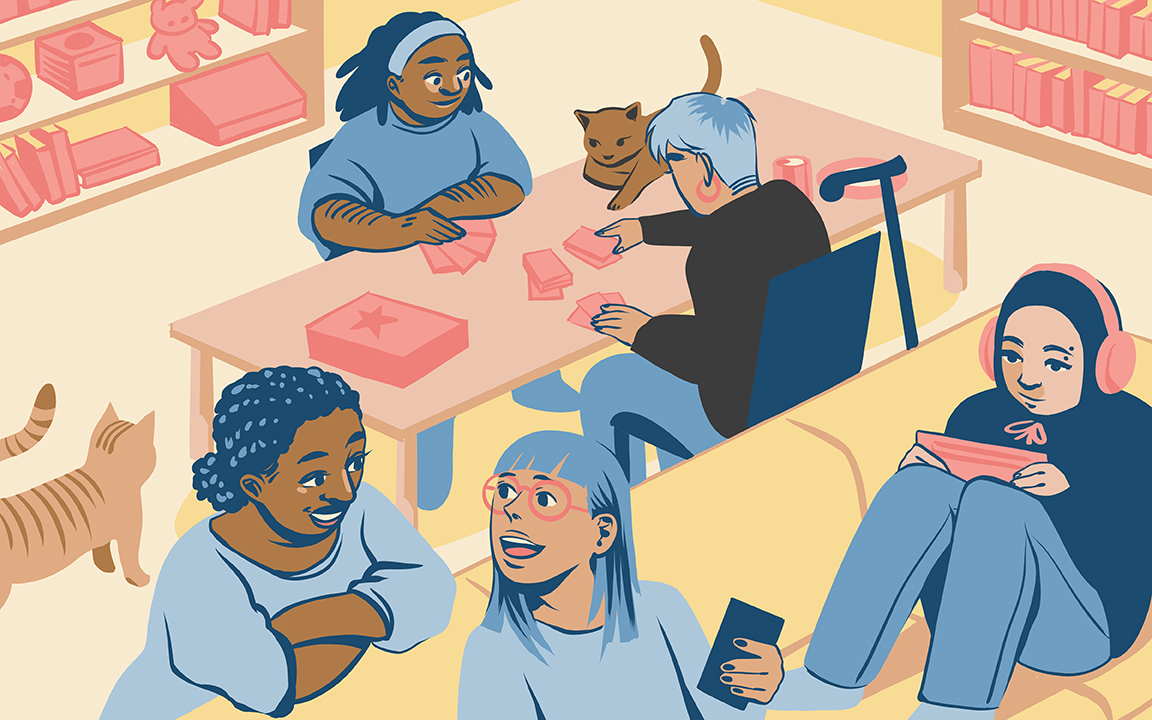Neurodivergent people
Navigate gender-affirming care with support tailored for neurodivergent people.

Understand
How can my neurodivergence affect my gender experience?
Affirming your experienceSetting expectationsSensory processing differences & gender affirmation
Get support
Why is support important? How do I make a support plan?
Why is support important?What type of support works best for you?Choosing a support person or buddyHow to support yourself
Navigate the system
What can I do to make my health care experience easier?
Understand
Affirming your experience
We won’t sugarcoat it: being neurodivergent in a world built on neurotypical assumptions can be hard. Neurodivergent people who are also trans, Two-Spirit A term used within some Indigenous communities to reflect complex Indigenous understandings of gender and sexuality and the long history of sexual and gender diversity in Indigenous cultures. Two-Spirit encompasses sexual, gender, cultural and spiritual identity. It may refer to cross-gender, multi-gender or non-binary gender roles, non-heterosexual identities, and a range of cultural identities, roles and practices embodied by Two-Spirit peoples. Some people also use "2-Spirit" or "2S." (Source: Battered Women’s Support Services) or non-binary Umbrella term referring to people whose gender does not fall within the binary gender system of woman/girl or man/boy. Some individuals identify as non-binary while others may use terms such as gender non-conforming, genderqueer, or agender. Non-binary people may or may not conform to societal expectations for their gender expression and gender role, and they may or may not seek gender-affirming medical or surgical care. often face extra challenges. The way we exist in the world doesn’t always fit expectations, and at times we might feel ashamed, isolated, or not good enough.
You may have experienced:
- Feeling misunderstood
- Struggling to navigate social situations
- Having your gender called into doubt because of your neurodivergence
- Being overwhelmed by emotional pain when you feel criticized, rejected or that you have failed
- Spiralling through anxiety feedback loops that create a cycle of negative emotions and behaviours
When things get tough, remember:
- You matter, and your needs are important.
- You deserve care that supports who you are, including your gender and your neurodivergence.
- You have the strength to take care of yourself and seek support.
Affirming Reflections for Neurodivergent People
Getting gender-affirming care Processes through which a health care system cares for and supports an individual while recognizing and acknowledging their gender and expression. can take time in B.C.'s medical system, which has many steps and waiting periods. It's common to feel anxious when you don't know exactly when things will happen, especially when you may have a lot of emotional investment in the outcome.
If you're thinking about hormone therapy or surgery, one of the first steps is a readiness assessment An evaluation conducted by a health care professional to determine if a patient is ready to begin hormone therapy or have gender-affirming surgery. . This is a conversation with a health care provider about your goals and what you hope to achieve through hormone therapy or surgery. They will discuss your unique needs and help make sure you have the right support in place for a successful care journey.
There can be gaps in the information you receive from your health care providers. This is a very common experience, and it is okay to ask questions if you are unclear. You may not always get the information you want, like exact wait times, because they change often.
Medical offices can be bright and noisy, with strong smells. Bring noise-cancelling headphones, sunglasses, fidget devices, or other tools to help manage discomfort.
During check-in, you often interact with people other than your provider, such as medical office assistants. They may have questions you need to answer or forms you must complete before your appointment. Expect small talk when you check in.
Your health care provider may not be experienced in providing gender-affirming care Processes through which a health care system cares for and supports an individual while recognizing and acknowledging their gender and expression. . If they are willing to learn, you can direct them to the Health Professionals section of this website. Alternatively, they may refer you to someone else, such as a specialty care clinic or endocrinologist A doctor specially trained in the study of hormones and their actions and disorders in the body. .
You may want to be proactive so this doesn’t happen to you. You can contact the office before your appointment to ensure they have recorded your name and pronouns, and ask them to add a note so they refer to you in the correct way. You could also hand the receptionist a note at check-in that says, "My legal name is listed, but I want to be called [chosen name]. My pronouns are…"
Sensory processing differences & gender-affirmation
Neurodivergent people may experience challenges with common gender affirmation The ways a person can be supported in expressing their self-identified gender. This may involve supporting social transition steps or changes in gender expression. techniques due to the way we process sensory information.
Examples include:

Gender-affirming wear
Items like bras, binders and breast forms can sometimes be uncomfortable and difficult to use. Consider the times and settings where it's most important for you to wear gender-affirming garments, if you can't wear them all the time. You might also experiment with different brands or styles of bras and binders, e.g. wearing sports bras rather than underwire.

Using cosmetics
You might find it difficult to use certain cosmetics due to the unpleasant physical sensation of makeup on your face. You may adjust to this over time, or you may not. Consider acclimatizing yourself gradually by wearing fewer products and building your tolerance over time.
You might also experiment with different types of cosmetics, including lightweight products, unscented or lightly scented products, or products for sensitive skin. It may help if you’re able to identify textures or consistencies you particularly dislike and which you find more tolerable.
Read more: Makeup and Masking — this blog post by AutismBC includes a sensory-friendly makeup tutorial and interview about the intersection of makeup and autistic masking.

Hormone treatment
You may have challenges using needles. Bodily changes like hair growth or skin texture changes may feel uncomfortable.
Testosterone therapy often leads to bottom growth (growth of clitoral tissue) and the thinning and drying of the lining of the internal genitals, both of which can cause chafing and discomfort. Your provider can provide you with suggestions to mitigate these concerns based on the type of hormone therapy and the specific sensory issue.

Surgery
Any surgery can affect sensation, potentially causing numbness, hypersensitivity, or changes in how you feel heat or cold.
Your surgeon can tell you what to expect in the different stages of healing. If you can access a registered massage therapist or other bodyworker with experience in scar care, they may be able to help you maximize your outcomes for nerve regrowth and scar tissue repair.

Sensory overload in medical environments
Medical office environments can be overwhelming and disorienting.
Common sensory processing challenges include bright or flickering lights, discomfort with crowded spaces, waiting room noise, unfamiliar smells, not hearing your name being called for your appointment, and information overload. When we feel anxious, our ability to process sensory information may decline, which can further worsen our anxiety. It may help to anticipate potential issues based on your past experiences in public spaces, and come prepared with tried and tested coping strategies.
Get support
Why is support important?
Having sources of support—someone or something to rely on—can make a big difference during your medical transition Process of undergoing the medical steps a person deems necessary in order to more closely align their physical body with their gender. This may include hormone therapy or gender-affirming surgeries. . This support could come from a resource, a counselling professional, or a friend or family member, or yourself.
What type of support works best for you?
Consider these questions:
- Do I need help staying organized or managing my time?
- Would I like help communicating with health professionals?
- Do I want someone to come with me to appointments?
- Do I need someone to talk to before or after my appointments?
- Are there steps a health provider could take to make an appointment easier for me?
How to support yourself
Stress may be especially high during a gender-affirming care Processes through which a health care system cares for and supports an individual while recognizing and acknowledging their gender and expression. appointment, making it even more important to speak up for what you need.
It’s okay to ask for sensory adjustments.
It’s okay to ask for sensory adjustments, such as low lighting or a virtual appointment.
It's okay to tell health care providers how you communicate best.
Many health care providers don’t have training on how to work with neurodivergent people, so you may find it helpful to tell them how you communicate best.
For example, you could say:
"I have something written down that I would like you to read."
"I tend to take things literally. Could you clarify what you meant by...?"
"It works best for me if you explain things one step at a time."
It's okay to take your time or ask for more information.
You may find their questions confusing and your answers may not always match their expectations. You can take your time or ask the provider to explain themselves differently.
Some ideas to help:
- Write down a list of questions or concerns before the appointment.
- Ask the health care provider to ask you one question at a time.
- Bring communication aids, like emotion cards or info cards to explain how you feel, or a speech-generating device or app.
- Ask for a longer appointment when you first book your visit.
If a question feels too hard to answer, it’s okay to say,
"I need more time to think."
"I'm not sure how to answer that right now."
Other ways to support yourself
Unfortunately, it often falls to us to advocate for our needs in a health care system that isn’t designed to accommodate them. This can feel deeply frustrating and unfair, and it is. It may help to focus on your goal for each health care interaction and take actions in the moment to support your emotional regulation and wellbeing.

Reflect on your strengths
Think about what makes you strong and capable. Maybe you’re good at solving problems or navigating systems that weren’t designed for you. You may have had to learn to be resilient to cope. All of these skills are valuable in your health care journey.

Build your confidence
Many neurodivergent people have faced negative messages and low self-esteem. Working on building your confidence will help you advocate for yourself better.

Try sketching or journalling
Activities like drawing or journaling can help you vent and process your feelings and experiences.

Use embodiment exercises
These activities help you connect with your body and manage stress. Examples include deep breathing, stretching, or using sensory tools that comfort you.
If you want a buddy with you in person to help you communicate with health professionals, someone who knows you and your communication preferences may be best. A friend or family member, for example, can more easily recognize when you’re confused, frustrated or overwhelmed and intervene on your behalf.
If you’re Indigenous, First Nations and Indigenous groups as well as health authorities may be able to connect you with Indigenous patient navigators to offer support in medical settings.
If you want emotional support throughout your medical transition Process of undergoing the medical steps a person deems necessary in order to more closely align their physical body with their gender. This may include hormone therapy or gender-affirming surgeries. there are options, depending on your preferences and resources. You could work with a therapist, ask a roommate to debrief after appointments, or schedule calls with your family when needed. Connecting with a peer support group made up of others who understand your experiences can help with feelings of loneliness and provide useful advice.
- Autistic Queer Peers by Qmunity — A peer support group for autistic queer A reclaimed term for non-heterosexual or non-cisgender people. "Queer" provides convenient shorthand for "LGBT2Q+", and is also used by some people to describe their personal identities. and trans adults 18 years or older who live in B.C.
- Peer Support Directory — Learn about support groups and services throughout B.C. for trans, non-binary Umbrella term referring to people whose gender does not fall within the binary gender system of woman/girl or man/boy. Some individuals identify as non-binary while others may use terms such as gender non-conforming, genderqueer, or agender. Non-binary people may or may not conform to societal expectations for their gender expression and gender role, and they may or may not seek gender-affirming medical or surgical care. and Two-Spirit A term used within some Indigenous communities to reflect complex Indigenous understandings of gender and sexuality and the long history of sexual and gender diversity in Indigenous cultures. Two-Spirit encompasses sexual, gender, cultural and spiritual identity. It may refer to cross-gender, multi-gender or non-binary gender roles, non-heterosexual identities, and a range of cultural identities, roles and practices embodied by Two-Spirit peoples. Some people also use "2-Spirit" or "2S." (Source: Battered Women’s Support Services) individuals.
- Online groups — Facebook groups, Discord servers and other online communities can offer advice and support.
Some people want to feel both supported and autonomous. If you want to do things on your own, you can arrange for a friend or family member to be available by text or phone call during your appointments.
Different people can support you in different ways. For example, one person might help with transportation, while another sends support over text.
Resources for your support person
If your support person would like to understand how to assist you better, share the guide, How to Support Someone Who is Neurodivergent, with them.
How to Support Someone Who Is Neurodivergent
Share this guide with your support person.
Info for getting started
Our website has detailed information to guide you through the process of:
Get help from our health navigators
If you need support at any point, our health navigators are here to help.
Before your appointment
What do I want to accomplish during my appointment?
Think about what you want to get out of your appointment. Write down your goals and any questions you have. Some people find it helpful to role-play the appointment to reduce anxiety and feel prepared.
Do I want a support person to attend with me?
If you choose to have a support person attend your appointment, be sure to ask them well in advance.
Do I have needs or accommodations that the clinic staff should know about?
Communicating your access needs (such as low lighting or a virtual appointment) before the day you arrive will set you up for success.
Are there medical symptoms I want to discuss with my health provider?
If you have any ongoing medical symptoms relevant to the care you’re seeking, tracking them in a journal or app can be helpful. This record makes it easier to explain any health issues when you meet with your health care provider.
How can I help myself arrive on time?
Map out the route in advance. Budget time for steps like sitting in traffic, parking, walking to the clinic, and checking in. If you feel anxious about arriving on time, you can travel early and wait in a nearby coffee shop, if available. Set an alarm on your phone so you leave this area on time.
What will I do while I wait?
Waiting rooms can be distracting, and medical appointments often start late. Stay focused on your goals by reviewing your notes, reading something related to your appointment, or listening to a relevant podcast. Avoid getting lost in your phone or unrelated activities.
During the appointment
How will I record important information from my appointment?
Decide in advance where you’ll write down any instructions or next steps you receive. You may want to set up a reminder on your phone to go back and review these notes in the coming days. You can also ask your provider if you can record the session, letting them know it helps you keep track of what was discussed—though they may not always agree to it.
Do I want to communicate any boundaries to my provider?
For example, if you’re worried about being touched, you can politely remind health care providers to ask before touching you. You can say, "Please let me know before you touch me."
After the appointment
Have I booked any necessary follow-up appointments?
If you need a follow-up visit, try to book it before you leave the clinic.
How will I take care of myself after the appointment?
An appointment might not go as you hoped. Even if it goes well, you might feel down afterward. Here are some things to keep in mind:
- Emotional ups and downs are normal — After a big success, feeling low is common. For people with ADHD, this happens because the excitement or challenge is over, and your brain misses the stimulation.
- Plan time to rest after your appointment — Give yourself space to process what happened and transition into the rest of your day without feeling overwhelmed.
- Talk it out — Debrief with someone you trust. Sharing your feelings with a friend, family member, or support person can help you gain perspective.
- Avoid focusing on the negatives — If you find yourself obsessing over something that didn’t go as planned, remind yourself of your bigger goals. It’s okay if everything wasn’t perfect.
Resources for neurodivergent trans people
Below is an evolving list of resources, and we welcome your input. If you have any resource recommendations you think are helpful, please contact us.
- Neuro/Diversities by Altérheros — This project offers personalized support and group meetings for youth aged 14 to 30 who are at the intersection of neurodiversity and sexual and gender diversity.
- PHSA BC Autism Assessment Network — Learn about the autism assessment programs in B.C.
- Autism Support Specialists (Government of British Columbia) — Access Autism Support Specialists who can provide more information and guidance if you need help.
- LGBTQ2S+ Toolkit, Celebrating Neurodiversity, Gender Diversity and the Community (Aide Canada) — This toolkit focuses on LGBTQ2S+ awareness, visibility, and talking openly, designed for people with neurodiversity and their caregivers and families.
- Autistic Self Advocacy Network (ASAN) — This organization, which is 2SLGBTQIA+ friendly, works toward a world where autistic people have equal access, rights and opportunities.
- Meet the People Being Left Out of Mainstream Conversations about Autism: Trans and Autistic. Weiss, S. (no date). | Jessica Kingsley Publishers - USA.
- Neurodivergence in the LGBTQ+ Community. Moyerbrailean, A. (2021, December 22).
- A guide for queer folks who just learned they have ADHD. Dopp, S. (no date).
- Largest study to date confirms overlap between autism and gender diversity. Dattaro, L. (no date). The Transmitter.
- Trans and Autistic by Noah Adams and Bridget Liang — This book shares the perspectives of autistic transgender individuals as they discuss the intersection of their autism and gender identity A person's deeply held, internal sense of themself as male, female, a blend of both or neither. (Source: GenderSpectrum.org) and how this affects their lives.
- Spectrums edited by Maxfield Sparrows — Written by autistic trans people from around the world, this collection of personal essays reveals the struggles and joys of living at the intersection of neurodivergence and gender diversity.
- Supporting Transgender Autistic Youth and Adults: A Guide for Professionals and Families by Finn V. Gratton — This book helps professionals support autistic transgender youth and adults and guides parents in supporting their transgender autistic children. It shows how these identities overlap and raises awareness about their needs.
- Unmasking Autism by Dr. Devon Price — Written by a trans man A man who is trans. Most trans men were assigned female at birth and have since socially and/or medically transitioned to male. , this book explores various experiences with autism and the concept of masked autism while also expanding society's understanding of neurodiversity.
Community Voices

When you start gender-affirming care you don’t know what’s going to be asked in each appointment. It’s stressful because it feels like if you don’t respond in a certain way they could deny you care. Bringing my mom to appointments makes a difference. She helps me communicate with my doctor by rephrasing their questions in ways that make sense to me.
—G, on the importance of having a support person

I was nervous about the readiness assessment because I didn’t know what to expect. But my doctor explained everything and didn’t rush me. I brought a list of questions so I knew what to ask so I could understand the next steps.

